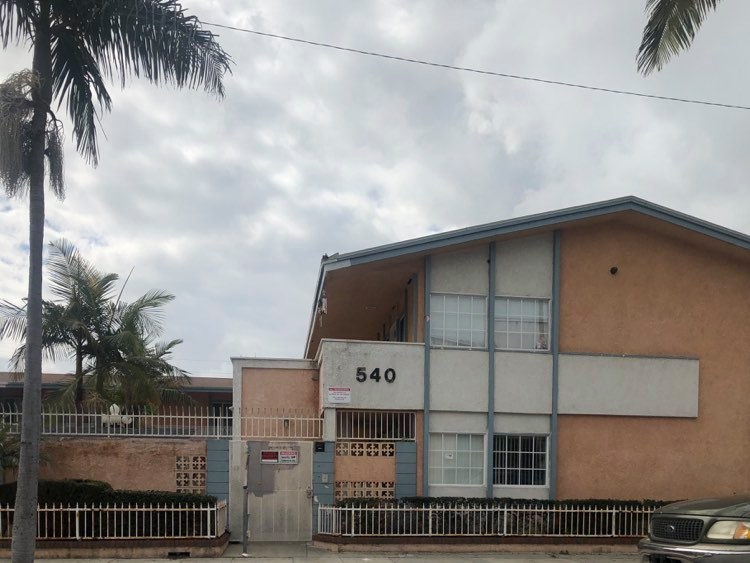Multi-Millionaire Vanderbilt Descendant Evicting North Long Beach Tenants Amid Coronavirus Pandemic
9 minute readFirst she lost her husband, then her job, and now she might lose her home of seven years as a deadly outbreak sweeps the world outside her door.
Norma Chavez buried her husband of seven years two weeks ago after he died of cancer. Shortly after, she lost her job as a hotel housekeeper at the Hyatt Hotel in Huntington Beach. She was laid off by the staffing agency that employed her when tourism plummeted due to the COVID-19 pandemic restrictions.
If that wasn’t enough to deal with, she and her neighbors have been under constant threat of eviction since October. That means uncertainty has loomed over the tenants at 540/550 East 64th St. as Christmas came and went, as a new year dawned, and now during a global health crisis that has paralyzed the economy. The latest 60-day notice arrived on March 13, the day President Donald Trump declared a national emergency in response to the pandemic, which has killed at least 550 and infected at least 50,000 in the country. The City Council today will vote on a temporary eviction moratorium for those affected by the pandemic, but its unlikely to help these tenants.
“It’s a lot of stress. Having one eviction notice after another while my husband was sick; you can imagine how I was feeling,” Chavez said in Spanish. “I was working and paying here and there what I could, and after he died, I had a lot of expenses dumped on me.”
She is one of three tenants in the building who lost jobs in the hotel industry because of the pandemic and now have no income.
“My job is in cleaning hotels. I’ve gone and looked and applied. No hotels have jobs right now. All they say is ‘Wait for all this to be over.’ Their occupancy is very low right now,” she said.
Sale of the building to a limited liability company was finalized on Oct. 16, according to county assessor records. Two days later, WestStar, the new property management company, sent 60-day eviction notices to eight of the households, saying the owner intended to rehabilitate the property.
The sole member of the company, unassumingly named 540 E 64th St LLC, is James Burden, according to forms filed with the California Secretary of State.
We reached out to Burden for comment via a direct Facebook message and a direct Instagram message but he did not reply as of press time. We also tried to reach him via various business associates to no avail.
A 2013 article in Los Angeles Confidential magazine described him as “the offspring of New York’s Vanderbilt and Burden families” and a “a real estate developer and investor” who co-founded (now-seemingly-defunct) luxury accessories brand Nat Boyd. Assessor records show he owns a $2 million home in the Santa Monica canyons.
Records also show he owns at least two other apartment buildings in Long Beach through limited liability companies, one of which had a lien placed on it for not paying code enforcement fines last year.
Bad news comes in threes
The initial 60-day notices given to tenants in October were rescinded only for a second round of them to appear on tenants’ doors on Jan. 3. The reason for the eviction this time was carefully crafted on the notice: “Intent to substantially remodel the residential property.”
That’s one of four no-fault reasons landlords can evict a tenant under the state’s Tenant Protection Act, which went into effect at the beginning of the year.
Then on Feb. 11, the City Council voted to require landlords to pull construction permits before issuing eviction notices for substantial remodels and made the rule retroactive to Jan. 1.
As a result, the tenants’ 60-day notices were once again voided. Nonetheless, a third one arrived on March 13, as the nation was going into crisis mode.
“This company is just trying to evict tenants one way or another,” Norbeto Lopez, director of Long Beach Residents Empowered, said. The organization has been helping tenants fight the onslaught of eviction notices.
WestStar did not reply to a request for comment. The Gardena-based business manages “over 1500 units in over 145 buildings throughout the Los Angeles area,” according to its website. Tenants at another Long Beach building managed by WestStar at Ocean Boulevard and Cherry Avenue also received 60-day notices on March 13.
The company has an “F” rating from the Better Business Bureau.
“They’re people who have no conscience,” another tenant, Antonia Zavala, said of those trying to kick residents out. “Only people who have no conscience would do something like this.”
Zavala lives with her husband and two older children and has been in the building for 14 years. Like her neighbors, she pays $1,000 rent for a one-bedroom apartment.
The building’s Latino tenants also include fixed-income seniors and families with young children.
“(The children) are suffering a lot because they’re used to the area, they go to school here. They’ve been living here ever since they were born. They’re really sad,” she said.
She believes the owner wants to raise the rent by $600 and since state law does not allow for a hike that high, the landlord’s only option is to evict all the tenants and bring in new ones.
She says in recent days noise and dust from construction work going on in some of the building’s vacant apartments has made it hard to live there.
Then on Wednesday, tenants received a text from WestStar advising them that due to the work their water would be shut off the following day—during a national emergency. WestStar walked back the decision the next day after outcry from tenants and the public, said Zavala.
Tomisin Oluwole
Ode to Pink II, 2020
Acrylic and marker on paper
14 x 22 inches
Click here to check out our interview with Tomisin Oluwole, a a literary and visual artist based in Long Beach.

Instead of gunking up our site with ads, we use this space to display and promote the work of local artists.
View this post on Instagram
But what has essentially become a siege against the renters has already resulted in the expulsion of two residents, said Zavala. According to her, one woman developed severe headaches due to the anxiety brought on by the eviction threats and left; another was pregnant and followed the advice of her doctor to find a less stressful living situation or risk a miscarrige. A third tenant was evicted after losing his job at a manufacturing plant.
Jennifer, an 18-year-old Long Beach City College student, who asked that her last name not be used, lives in the building with her brother and parents and says their bathroom ceiling is collapsing bit by bit and has a mold problem.
“They’ve seen the bathroom,” she said of the property management’s maintenance crew. “They just haven’t done nothing about it.”
At one point, dust from the collapsing roof fell into her eyes, causing irritation for several days, she said.
Her mom, who cleans homes, has had some of her clients cancel appointments since the pandemic erupted, tightening the household’s income.
“It’s more stress and more worry,” she said. “We always pay our rent on time, so we don’t really understand the evictions.”
Will the city’s temporary eviction moratorium be enough?
The City Council last week voted to move forward with a temporary moratorium on non-payment evictions for tenants affected by the COVID-19 pandemic. They will take a final vote at a special meeting at 4:30 p.m. today.
But the ordinance will still allow landlords to evict a renter for all other reasons allowed under state law, including if an owner plans to do substantial renovations in a renter’s unit.
Councilmember Rex Richardson (CD-9), whose district the 64th Street building is located in, pressed the council on this during last week’s meeting.
“For example if a building, an entire building, dozens of families, recieve a 60-day notice due to substantial remodel, then it would be very difficult,” he said. “Some of those people will likely have been evicted because of COVID-19 and some of them will not. How do you evict a building for substantial remodel in this moment? That’s a lot of movement and its counterintuitive to our social distancing strategy.”
But earlier in the meeting, Councilmember Suzie Price (CD-3) made it clear that she wanted to infringe as little as possible on landlords’ abilities to evict.
“I have no interest in supporting a motion tonight that ties the hands of property owners for non-COVID-related evictions that are legally enumerated in the California code,” she said.
In the end, Price and four other councilmembers had the numbers to narrow the moratorium’s application only to renters whose inability to pay rent was a result of COVID-19.
Richardson, along with Councilmembers Jeannine Pearce and Mary Zendejas expressed the need to expand the moratorium in the future as the situation evolves.
It’s unclear if the city would be able to ban substantial remodel evictions during the crisis. Gov. Gavin Newsom last week only authorized cities to put temporary moratoriums on evictions for non-payment due to COVID-19.
The irony for the 64th Street tenants is that the COVID-19 pandemic may be the thing keeping them in their homes for now.
Lopez says the 60-day notices issued to tenants this month only had attached to them an inspection report and not a copy of a building permit, as required by the city when evicting for planned renovations. With the city’s Development Permit Center closed because of the pandemic, it’s unlikely the landlord will be able to pull the proper documents for at least another week.
Still, tenants say, this is of little consolation because they know that the landlord will boot them out as soon as he has the chance.
“We’re in limbo,” said Zavala. “We don’t know where we’re going to go. We don’t know what we’re going to do.”
Updated at 3 p.m. 3/24/2020 to add link to Gov. Gavin Newsom’s order authorizing local governments to halt evictions.


 kevin@forthe.org
kevin@forthe.org @reporterkflores
@reporterkflores




